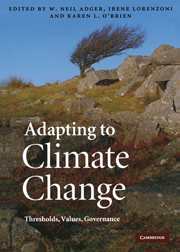Book contents
- Frontmatter
- Contents
- List of contributors
- Preface
- 1 Adaptation now
- Part I Adapting to thresholds in physical and ecological systems
- Part II The role of values and culture in adaptation
- Part III Governance, knowledge and technologies for adaptation
- 20 Whether our levers are long enough and the fulcrum strong? Exploring the soft underbelly of adaptation decisions and actions
- 21 Decentralized planning and climate adaptation: toward transparent governance
- 22 Climate adaptation, local institutions and rural livelihoods
- 23 Adaptive governance for a changing coastline: science, policy and publics in search of a sustainable future
- 24 Climate change, international cooperation and adaptation in transboundary water management
- 25 Decentralization: a window of opportunity for successful adaptation to climate change?
- 26 Adapting to climate change in Sámi reindeer herding: the nation-state as problem and solution
- 27 Limits to adaptation: analysing institutional constraints
- 28 Accessing diversification, networks and traditional resource management as adaptations to climate extremes
- 29 Governance limits to effective global financial support for adaptation
- 30 Organizational learning and governance in adaptation in urban development
- 31 Conclusions: Transforming the world
- Index
- References
30 - Organizational learning and governance in adaptation in urban development
Published online by Cambridge University Press: 31 August 2009
- Frontmatter
- Contents
- List of contributors
- Preface
- 1 Adaptation now
- Part I Adapting to thresholds in physical and ecological systems
- Part II The role of values and culture in adaptation
- Part III Governance, knowledge and technologies for adaptation
- 20 Whether our levers are long enough and the fulcrum strong? Exploring the soft underbelly of adaptation decisions and actions
- 21 Decentralized planning and climate adaptation: toward transparent governance
- 22 Climate adaptation, local institutions and rural livelihoods
- 23 Adaptive governance for a changing coastline: science, policy and publics in search of a sustainable future
- 24 Climate change, international cooperation and adaptation in transboundary water management
- 25 Decentralization: a window of opportunity for successful adaptation to climate change?
- 26 Adapting to climate change in Sámi reindeer herding: the nation-state as problem and solution
- 27 Limits to adaptation: analysing institutional constraints
- 28 Accessing diversification, networks and traditional resource management as adaptations to climate extremes
- 29 Governance limits to effective global financial support for adaptation
- 30 Organizational learning and governance in adaptation in urban development
- 31 Conclusions: Transforming the world
- Index
- References
Summary
Adaptation in urban development: a complex coordination problem
In this chapter we focus upon the lack of coordination between different actors, which is a pronounced problem in urban planning and development, as a possible barrier to adaptation to climate change. This has to date received little attention in the literature. Our aim is to contribute to the development of a model for analysing how different coordination mechanisms can hinder or encourage adaptation. Different forms of coordination are normally attributed to different modes of governance, and in this chapter we distinguish between three modes (which are often also observed in urban planning and development): a hierarchical mode in which coordination of different actors is ensured through formal regulations, command and control; a market mode in which coordination of actors is ensured by the price mechanism of the market; and a network mode of governance in which coordination ideally happens through arguing and bargaining among the involved actors. We explore how the mode of governance and the corresponding form of coordination influences how actors interpret signals from their surroundings, how they search for solutions to perceived problems, how solutions are articulated and put into action and eventually how the implementation of solutions is evaluated. In short, the specific mix of governance modes at play will influence the actors' learning processes, their use of available knowledge, and hence their capacity to adapt to climate change.
- Type
- Chapter
- Information
- Adapting to Climate ChangeThresholds, Values, Governance, pp. 476 - 490Publisher: Cambridge University PressPrint publication year: 2009
References
- 10
- Cited by



